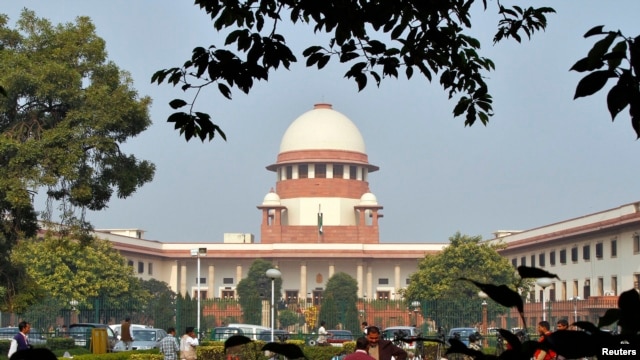In 2008, when India’s Congress-led government faced a close confidence vote, five legislators were temporarily freed from jail to participate. Although convicted for crimes ranging from extortion to murder and kidnapping, they retained their parliamentary seats because they could continue in office pending appeals to higher courts.
But that is to change. The Supreme Court ruled Wednesday that future lawmakers are to lose their seats if they are convicted of a serious crime. They will also be barred from contesting elections if they have been sentenced to at least two years in jail.
The ruling is being hailed as a major step in cleaning up Indian politics, where nearly one third of the members of parliament and state legislatures are charged with criminal cases.
It is widely accepted that criminals and strongmen, with wealth to fund election campaigns, have found a berth in virtually all political parties.
Anil Bairwal of the Association of Democratic Reforms says the problem snowballed as parties chose to field candidates guaranteed to deliver votes.
“Our political parties, they have chosen to give tickets to people on the basis of “winnability” factor. And the two main ways for them to win elections: one is muscle power and other is money power. Using muscle power they are able to round up people and threaten them to get votes. That is why they started getting these type of candidates. Over a period of time this issue has become too large," said Bairwal.
In the present parliament, 162 of 543 members face criminal charges, according to the Association of Democratic Reforms. The opposition Bharatiya Janata Party has 42 MP’s charged with crimes, the ruling Congress Party, 41.
And in a country with a slow justice system, where cases and appeals often drag on for decades, such candidates continue to fight successive elections.
George Mathews with the Institute of Social Science in New Delhi says that has led to a degeneration of India’s vibrant democracy.
“A system, and a thinking, and a culture, which was prevailing for the last 65 years, can you overnight change it with one verdict? No. This is the first step. There are several other steps to follow. This has to be accepted by all political parties as a culture, that this is something we will implement so that only men and women with integrity will enter public life," said Mathews.
Political parties have reacted guardedly to the ruling. The ruling Congress Party says it will consult other parties on the course of action regarding the verdict. The BJP said any step to purify and strengthen the political system is welcome.
Anil Bairwal hopes that practical considerations will prompt political parties to weed out candidates with a criminal record.
“Now political parties will have to think twice about giving tickets to tainted candidates because they will have to worry that if they are convicted by a court, they will lose their seat and that will bring down their number," said Bairwal.
Civil society groups say they will keep a close eye on political parties as they nominate candidates for national elections scheduled to be held in 2014.
The parties say any real effort at cleaning up politics can only come if there are more transparent ways to raise money to contest elections in a country where corporate funding is outlawed
.


